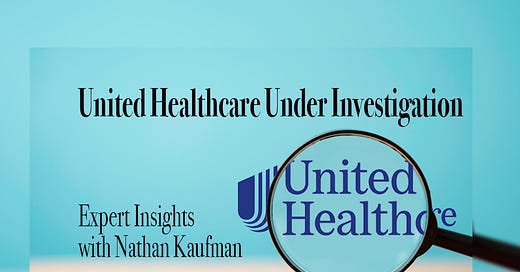Editor’s Note: We hope you enjoy the video above. If you’d rather just listen to the podcast, click the button below to Apple Podcasts: The Common Bridge. It is also available on all other podcast platforms. We have included the transcript to this program below. We offer this program in it’s entirety to our paid subscribers, and welcome all to subscribe below.
You can also help the show by contributing in any of these methods:
• Shop. https://thecommonbridge.com/subscribe-shop/
• Zelle. rich@richardhelppie.com
• Buy Me a Coffee. buymeacoffee.com/RichHelppie
You can also send an email to Editor@TheCommonBridge.com
Thanks!
Richard Helppie
Hello. Welcome to The Common Bridge. We have a returning guest, healthcare expert Nathan Kaufman, all the way from San Diego. Kaufman Strategic Advisors, the preeminent source on all things for healthcare economics, has been at it a long time. Nate, my friend, it's good to see you. How are you?
Nate Kaufman
I'm doing fine, Rich. Yeah, 48 years in healthcare is a long time. It's just a blink of an eye, I guess.
Richard Helppie
That it is. In those 48 years you've seen healthcare become the largest part of our economy. I wish this was an original line, but it's been described as the largest segment of the largest economy in the history of the world, and it affects all of our lives. Whenever there's money involved there are people that do ethical things and then others [who don't]. Just yesterday, it's been reported that United Healthcare is under criminal investigation for Medicare fraud. What is it that we know about this? What's going on?
Nate Kaufman
There's an organization called MedPAC, which is the Medicare advisory group that advises Congress. They did a study and what they found was that an estimated $84 billion is spent in excess under Medicare Advantage than it would have been under traditional Medicare. In other words, if all those people were in Medicare, traditional Medicare, the country would have saved $84 billion. My speculation at this point is where the government is focusing. If they are focusing on something, it would be on fraudulently coding the sickness of Medicare Advantage members.
Richard Helppie
And that's because under Medicare Advantage there is a higher reimbursement rate for patients that are more ill. For those people that aren't familiar with Medicare Advantage - which I term Medicare disadvantage - there's a gatekeeper. United Healthcare is one of the biggest gatekeepers; they offer lower premiums, broader set of services, but you have to go through their approval process. That's how they get to the lower rate and that reimbursement they get from the government. If there's an adverse selection where they get patients that are more sick, they should get a higher reimbursement. But what you're sniffing right now is that they are coding people that aren't as sick as being more sick.
Nate Kaufman
Yeah, let's go back. Medicare Advantage is basically a private insurance product. They receive a per member per month payment from the federal government and then they administer this private insurance to people over 65. Now the way it works is there's like an average per member per month rate for an average patient. So let's call that $1,000 for a second. The issue is Medicare recognizes that certain patients are going to need a lot more care than this standard rate, and so each patient is risk scored. So if the standard rate is $1,000 and I have all these chronic conditions and I'm going to need a lot of care, maybe I'll get a risk score of 1.5 which means the commercial insurance company will get $1,500 a month for me, not $1,000. So there's an incentive built into the entire process for the insurance companies to find as many problems with patients as possible and thus get higher reimbursement. There was a study done recently; they said the average risk score for traditional Medicare was 1.07, while the average risk score for Medicare Advantage is 1.26. In other words, somehow or another - by a miracle or by selection or by up-coding - the patients under Medicare Advantage have more chronic conditions than traditional Medicare.
Richard Helppie
Potentially they could be lower income people because we've all heard the ads: no premiums, and you get vision and you get dental. They don't tell you the other side of that; you also get the gatekeeper. Look Nate, in our career we've seen when the federal government couldn't get the cuts they wanted in healthcare expenditures they drag out a law, they go into a very complex coding world of healthcare, and say you defrauded us and alright, you can pay us - an old case, one of my clients - $40 million or you can fight it, and our first document request is going to take three semi-trucks to haul away. That can happen, that the government can kind of extort the insurance companies also. We don't know if that's happening but that's a possibility, right?
Nate Kaufman
Clearly. I've been expert witness in a case involving the government, and they kind of have unlimited funding, that makes it quite difficult. But in this particular case, the evidence is leaning towards the fact that there could be a coding issue with respect to certain plans, and United Healthcare would be one of them. United Healthcare - according to this study - out of the $33 billion in coding intensity that they identified that was excess, they attributed about 14 billion, almost half of that discrepancy, to United Healthcare so there may be something behind this investigation.
Richard Helppie
United Healthcare is coming out and saying that this reporting is deeply irresponsible, they think it's a stain on their business and their reputation and their public position. They are just befuddled as to why this is happening.
Nate Kaufman
That's what one would expect them to say, for sure. They also seem to have just lost their CEO and reinstated a former CEO in their place. So the company is clearly in some state of flux at this point in time. The other thing to point out, when you look at denial rates comparing the various health plans, United tends to be towards the top of the list. In a recent study, they had the denial rate for Medicare Advantage, which ranged from about three and a half percent to 13 and a half percent. United was at nine percent which means not all claims get scrutinized, but when you're scrutinized in Medicare Advantage, you have about a one in 10 chance of that claim being denied. In the commercial side, there's a law in Illinois that requires that all denials be reported. And United Healthcare had about a 20% denial rate, which they themselves reported, meaning one in every five claims that required proper prior authorization were actually denied. And one interesting point here is that if you go and appeal these denials, the success rate is like 70-80%. So if you're willing to spend the time, it's kind of like the federal government, United has all the time and all the resources. If you're a small doctor group or an independent patient, you don't have the resources to go through the entire denial process, so most of the time, these claims that are denied are not appealed.
Richard Helppie
When you think about that logically, the physician, the hospital, or other care setting, they want to get paid, they send claims to United all the time, and it's just implausible that they would say, yeah, we're going to send this to United, but they're going to reject it. They know the game; that United is going to reject it, and then they're going to be delayed and denied and eventually get paid after people - who are already sick, by the way - are put through this additional stress. It's a horrible business model, and United's income stream is tax supported.
Nate Kaufman
Yes, most of their profits, or much of their profits, come from Medicare Advantage. Again, here's a unique statistic; according to Bank of America, in 2024, 95% of all Medicare Advantage profits were generated by United Healthcare. So are they doing something better? Are they doing something differently there? This is kind of interesting: there was a recent case that involved a poor, anorexic girl, she was in an institution and then United decided - against her psychiatrist's recommendation - that she no longer needed that care and denied the care. And so this went to court, and then it went to a court of appeals, and here's what United said. In their own legal documents, they said United contends that reversing its denial would require adopting a quote "treating physician rule," unquote, which would unduly privilege treating providers over United paper reviewers. Now that was in their court documents. By the way, that one judge in the court of appeals said you are gambling with this little girl's life. What's happened is there are so many conflicts of interest regarding what is best for patients and their physicians versus what is best for the profitability of an organization, that while we can't make any firm allegations, we can certainly see that there's a lot of pressure to get more denials and to do more up-coding and do those kinds of things for an insurance company to generate profits for their shareholders.
Richard Helppie
And the dilemma, I think, that we're sitting on here is that there are more pages of Medicare regulations than there are IRS regulations, so the odds of somebody doing something in conflict with a Medicare regulation is almost a near certainty. Couple that with more and more digitization coming into healthcare - not enough and not fast enough, in my opinion - but some of this is resident in systems like Epic, and they're able to look in there. I think you've related to me stories about people finding out they got a diagnosis of congestive heart failure and they go, wait, I don't have congestive heart failure.
Nate Kaufman
Yeah, there was a case, a medical group up in Connecticut called ProHealth, and some of the physicians that retired noted in this article that they felt pressured to put certain diagnoses on the patients. There was training on how to do that, and in addition, they said that when or if they did, then it would appear in the patient's electronic medical record, the patient would be dinged. They'd all of a sudden find out they had vascular disease when nobody told them they did, and they'd have to call the physician up. So you're absolutely correct. There are lots of stories on the web about how providers that are affiliated with insurance companies are also having difficulties. I just want to make one point that you made. It turns out that 24 cents out of the federal budget goes to health care right now, and when you look at that, there's absolutely no way to balance the federal budget at this point in time without having some impact on either Medicare or Medicaid. And so what they're doing in Congress right now, everybody needs to watch because the impact will be significant. Now, if you're not on Medicaid, you say, well, I'm not on Medicaid, it's not a problem, but Medicaid pays 70 cents per dollar of cost. So what happens is (Richard Helppie: Medicaid or Medicare, pays?) Medicaid, and that's what the government is currently looking at, reducing the cost of or reducing coverage for. So if there are less people covered on Medicaid, then they become an uninsured, and as a result of that, there will be significantly more uninsured, and that will put pressure on hospitals and physician groups. Many of them will not be able to be sustainable if they see too many more uninsured patients for which they get no reimbursement.
Richard Helppie
That was one of the good things about the expansion, that at least there would be some revenue coming in and also, people would go see a physician when they had a smaller problem. If you take a person that's uninsured, they're not going to show up until they're in distress, and then you have a very high cost case, and you've just damaged that person's quality of life. I've looked at the compromise in the big bill the Republican congress is leading right now. Their compromise position on Medicaid seems to be they're going to put a moratorium on any new Medicaid provider taxes. I've explained that in a recent column, and there was a part of it that I didn't understand, didn't make any sense to me, that no state could have the Medicaid payment rate higher than Medicare's payment rate, and I thought that was a curious clause. I don't know why they would want to do that.
Nate Kaufman
Well, it's just capping the rates that hospitals and physicians will get paid for Medicaid, that's why they're doing it. Now, Medicare pays about 80 cents per dollar of cost. So a typical hospital - by the way, there's a law called EMTALA - Emergency Medical Treatment and Labor Act - what it says is, if you're a hospital, you have to treat anybody that walks in the emergency department and provide care to them. And so what's happened in our emergency departments is 40% of the visits are Medicaid, because the private physicians can't afford to take those patients. One physician said, if my practice was only Medicaid, I would be on Medicaid. So what happens is all the Medicaid patients and uninsured flood the emergency departments, and they enter the system that way, and that creates huge bottlenecks in the emergency departments and big problems for health systems.
Richard Helppie
Again, punctuating the point that there is not a bureaucracy out there, public or private, that is designed to provide any of us more healthcare. The system is set up to deny us healthcare, and there are people and companies that are looking at profiting from that. We can't get there by tweaking the current system, in my humble opinion, I don't know that anybody thinks we can. I think the biggest offenders are the big commercial insurance payers who, remember, they get their revenue from employer groups, for example, and that compensation is not subject to tax on the employee, and that is something that we could bring into balance quite easily. Their business model depends on denying care, and even when there are provisions, like the medical reimbursement levels, that they need to reach at 80% for small plans, 85% for large plans. They just set up physician groups, and they pay themselves from one pocket into another and reap their profits there. On a different episode we should dissect and diagram how the pharmacy benefit managers work. I think you like to call them cartels.
Nate Kaufman
Yeah, 80% of all drugs are funneled through three pharmacy benefit managers. One of them is OptumRx, owned by United, another one is CVS owned by Aetna, and another one is Express Scripts owned by Cigna. I don't want to go into detail today but we should at a future date, because the issue is healthcare is so complicated that these companies are benefiting from the complexity and opacity of the system. Most people don't understand all the nuances of healthcare, how it works and how people are taking money and where the middlemen are so one of the things we can do is spend some time trying to explain that.
Richard Helppie
You and I have both come together on what our recommendations are for reform. We need more people to get aware and write to their congressional representatives. It is a tragedy that the lobbyists are getting to do this, and we're not being served as a population. I guess we'll both be watching to see how this investigation plays out with United and see if there's an indictment forthcoming or if it goes away.
Nate Kaufman
It will be interesting, but it also be interesting just to watch United Healthcare, they're the fifth largest company, I think, in the country, if not the world, and they are exceptionally powerful at this point in time. They're continuing to grow, but they are in turmoil at this point in time.
Richard Helppie
Anything else we need to cover on this morning, Nate?
Nate Kaufman
I think we're up to date at this moment. Things could change in healthcare with a vote of Congress so we'll have to wait and see.
Richard Helppie
Indeed, and that's almost a sure bet, right there. We've been talking today with Nathan Kaufman from Kaufman Strategic Advisors from San Diego, California, a little snippet on healthcare. Expect Nate to be back as a regular contributor to The Common Bridge. And as always, we'd like to get your comments or questions, topics you'd like to see us cover. With my good friend and colleague, Nate Kaufman, this is your host, Rich Helppie, signing off on The Common Bridge.












Share this post